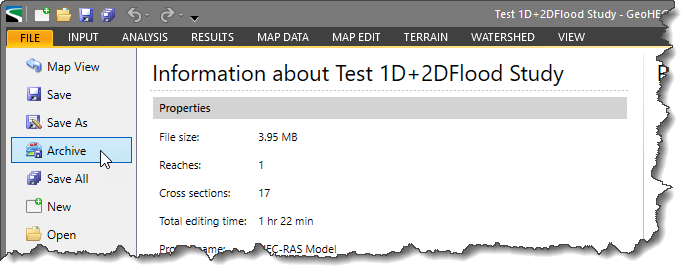Archiving is a process by which information or data are moved to a repository to securely store it for a longer period of time. It is a good practice to archive inactive or completed projects, so they do not clutter current project data and information. Project archiving is the best solution to keep the workspace clean. Some important benefits of project archiving are as follows:
- Prevent loss of data
- Retain all project data and settings
- Ensure only certain people can access specific information
- Keep project data and related information organized and easy to access
In CivilGEO software, project archiving can be performed with the Archive command.
Note that the following file formats are generally saved in the Archive command:
- TIF (Text image file format)
- DBF (Database file)
- SHP (Shapefile)
- SHX (Autodesk AutoCAD shape file)
- XML (Extensible markup language)
In addition to the above file formats, when you run an analysis on the project file that you have archived, additional file formats, such as .dss; .hms; .regn; .pdata; .sqlite, .vrt, etc. will be saved.
Follow the steps below to use the Archive command:
- From the File ribbon menu, select the Archive command.

- The Archive dialog box will be displayed.
- Browse to the desired location where you want to archive the project file, enter file name in the File name input field, and then click the [Save] button.
![Click the [Save] button](/wp-content/uploads/sites/25/2022/11/Archiving-of-a-Project-Image-2.png)
Note that the user can click the [Cancel] button to close the dialog box.
- On clicking the [Save] button, the Archive dialog box will disappear, and the status bar (shown under the Map View) will display a message relating to archiving the project.
![Clicking the [Save] button](/wp-content/uploads/sites/25/2022/11/Archiving-of-a-Project-Image-3.png)
- Once finished, the software will then save the archived project at the specified location.
